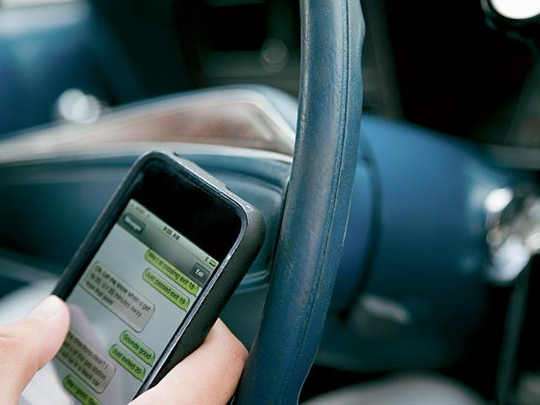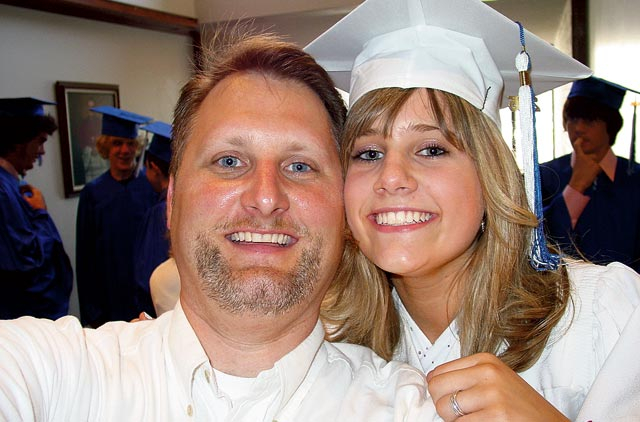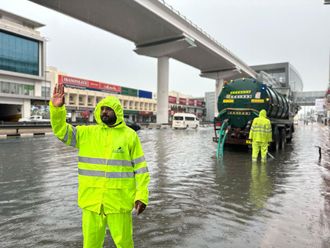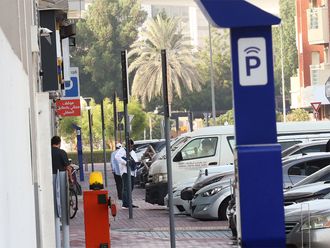
Sixteen-year-old Cady Reynolds’ future was as bright as her smile. She helped elderly neighbours, performed community service jobs with her school friends and even ‘adopted’ a needy family at Christmas, spending her money on the gifts.
Like many Grade 10 students at Marian High School in Omaha, Nebraska, USA, Cady was starting to make plans for her future. She wanted to be a doctor and volunteered at a local hospital while working hard to maintain her grades. As most young people do, one night Cady wanted to go to the movies and catch
up with her best friend.
At 11pm the pair headed home with Cady behind the wheel. The traffic light turned green and she made her way through an intersection. It was a clear night with 100 per cent visibility and Cady did everything right. But within seconds a white Chevvy Blazer came barrelling through the intersection. The driver, who was reportedly busy with her phone at the time, hadn’t noticed that the light had turned red. There was no sound of screeching brakes because she didn’t use them. There was no time to react because she hadn’t seen Cady’s Chevrolet Prizm in front of her – not until she slammed her SUV into Cady’s car at 80kph. The other driver was also just 16 years old.
While the other driver and Cady’s best friend sustained minor injuries, Cady was rushed to the hospital in a critical condition with head injuries that caused massive swelling in her brain. She passed away in the early hours of the next morning with her parents and uncle by her side.
“[The girl] cruised through the intersection as if nothing was going on and she wasn’t paying attention,” says Cady’s father, Robert Reynolds. “That’s a cruel way to lose somebody. That’s a very cruel way to lose somebody.”
The driver was charged with vehicular manslaughter and had her licence suspended. She was also required to perform community service. But the Reynolds family was devastated. “Cady was the big sister, the one who kind of stabilised everyone else and kept them in the right direction so [when she died] the other siblings had to figure out what their new roles were,” Robert, 46, says.
“For my wife and me, it meant discovering how to celebrate occasions all over again. It’s difficult because at every event we say, ‘Well, this is the first time we’re doing this without our daughter.’”
The distracted brain
Sleek and small, a cellphone only weighs an average of 200 grams. Yet, according to a 2010 report by the US Department of Transportation’s National Highway Safety Administration, distraction caused by these tiny devices is believed to be the reason behind an estimated 6,000 deaths each year in the US alone – that’s an average of nearly 16 every day. According to a 2011 report by the World Health Organization, 1.3 million people die in car accidents every year, an estimated one-third of which are due to mobile phone use.
Dr Paul Atchley, director of the PhD programme in cognitive psychology at the University of Kansas, states that drink driving increases the risk of accidents by 400 per cent, talking on a hands-free device increases the risk by 500 per cent and texting while driving increases the risk by an incredible 2,400 per cent.
Although here in the UAE the use of hand-held mobile phones is banned while driving and, if caught, offenders pay a fine of Dh200 and get four black points on their licence, more than 59,000 tickets were issued in Abu Dhabi and Dubai last year for the violation. The Dubai Police Traffic Department reports that 15,233 tickets were issued to motorists for using a mobile phone while driving in the first four months of 2012.
Nearly 60 per cent of UAE drivers still use phones without hands-free devices, a recent survey by Zarca Interactive has revealed. And a recent Gulf News report said that one in three drivers admitted to making or answering calls behind the wheel. Damien Reid, 42, a freelance motoring journalist and automotive industry consultant, has been driving in Dubai for seven years and has seen it all. “A car is not a place to drink coffee, talk on the phone, read or let children run around,” he says. “When these factors are included, a car becomes a killing machine.”
Using mobile phones while driving is a common problem that has caused an international tug of war between advocates of cell phone-free roads and the cellular telecommunications industry. And each side is fighting hard.
In 2009 at the Governor’s Highway Safety Administration Conference, Cady’s father Robert met other people who had also lost loved ones in distracted-driving accidents. Following the blueprint for Mothers Against Drunk Driving (Madd), they established FocusDriven. It is a Nebraska-based non-profit organisation that supports victims and families impacted by distracted-driving accidents, and pressures lawmakers to ban the use of mobile phones while driving. “I can take you out to any street... at any time, day or night and I can pull over six people myself in under an hour because they’re using their cellphones all the time,” says Robert, who is the executive director of FocusDriven. “People say, ‘I have the right to use my phone.’ When I talk about rights, I say that my daughter Cady had the right to live – so does everyone who gets killed by a cellphone.”
Dr Atchley, who has been researching driving related issues for over 20 years, says that in his study he discovered that people continued to drive while using their phones despite being aware of the dangers.
In the UK, the police are cracking down on drivers who are distracted while behind the wheel. Realising that it was difficult to spot offenders from ground level, they opted to look for offenders from a high vantage point – a lorry cab. Those found using a mobile phone while driving will face a £60 (Dh350) fine and three points on their licence.
Compulsive need to check social media
But why is it so hard for everyone to hang up and drive? Dr Atchley states that people engage in risky behaviour because they find it difficult to ignore social media. “People have a compulsive need to be so continuously engaged that they do it anyway,” he says.
In his earlier work, Dr Atchley set out to uncover the factors behind crashes caused by elderly drivers. But he soon saw similarities between elderly motorists and distracted drivers.
“We found that if you give a 19-year-old this simulated driving test, undistracted, they look like a fighter pilot,” says Dr Atchley. “When they’re distracted, they look like an 80-year-old adult with Alzheimer’s disease.”
He recalls a study where a simulator was used to compare drink drivers with drivers talking on hands-free devices. “Drink drivers know they’re impaired so they compensate,” he says. “While they reacted slower to a car braking in front of them, they slammed on the brakes trying to make sure that they stopped in time. People on their cellphones missed the brake lights altogether and just hit the vehicle in front of them.”
But sometimes, we’re not the ones in control. “A few times I’ve gotten into a taxi with a distracted driver and I’ve had to ask them to hang up the phone,” says Damien. “Most have complied but for those who didn’t, I had no problem stepping out of their taxi at the lights and hailing another one. In my seven years in Dubai I’ve only done that twice, but I’d rather get out and walk than risk being killed by someone trying to juggle driving with talking on the phone or texting.”
Shelly D’Amico, the co-owner of the Etiquette School of Chicago, agrees. “Sometimes people are distracted by a call or a text so they respond and forget they’re driving a car,” she says. “If you’re the passenger, bring the situation into the open by trying to be helpful. Say, ‘If you want to pull over for a few minutes we’ve got time, or if you want me to drive, I’d be happy to do that.’ Do it out of respect for both of your lives.” So what goes on in the brain that makes distracted driving so dangerous?
During a conversation, the prefrontal cortex is the part of the brain that’s engaged in coordinating tasks, remembering, rules, memory and other complex functions. It’s also the last part that’s wired as children develop, and the first one that’s affected during the onset of dementia.
According to David Strayer, professor of cognition and neural science at the University of Utah, the brain isn’t actually built to multitask. “Multitasking is a myth – we task switch,” he explains. “And it turns out that you can’t switch instantaneously. Even after you’ve hung up, it takes time to re-establish situational awareness, such as what the traffic is like or how fast you’re going.”
Shattered dreams
On May 18, 2008, a teenager driving his family’s car didn’t notice the light turn red at a busy intersection in Maidencreek Township, Pennsylvania. The 18-year-old driver was talking on his cellphone when he drove right into the path of an oncoming tractor-trailer. In an effort to dodge the teen’s minivan, the tractor driver Joseph Leonardo Jr, 44, swerved into another lane where Jacy Good, 21, was waiting at a red light in a white station wagon. She and her parents were on their way home from her college graduation. “That day was everything I had been working towards my whole life,” recalls Jacy. “Life was really coming together.”
The massive vehicle collided with the station wagon and Jean and Jay Good, Jacy’s parents, died within moments of the impact. Jacy was rushed to hospital in a critical condition.
Despite being given just a 26 per cent chance of survival, Jacy pulled through. Some of the injuries she sustained included broken teeth, a broken wrist, a broken tibia and fibula in her leg, a shattered pelvis, a broken collarbone, a lacerated liver and a traumatic brain injury.
“Broken bones heal,” says Jacy, who’s now 25 and living in New York. “But the brain injury has had a lasting impact. Since the right side of my brain was injured, the left side of my body doesn’t work very well so I’ve had to figure out how to do things with one arm. And no matter how long I sleep, I can never reach a deep sleep, so I require lots of caffeine during the day.”
Because of her brain trauma, it took months after she woke up from a coma for Jacy to fully understand that her parents had both died in the accident. She gave up her dream job at Habitat for Humanity to focus on three years of painful rehabilitation and therapy while grieving the loss of her parents.
“My parents and I were getting to a point where we were starting to get to know each other as grown-ups,” she says. “Although it was always a parent-child relationship, it was also turning into a real friendship, but that opportunity was taken away.”
The driver responsible for the crash, however, faced no criminal charges.
The ripple effect
Determined not to live a life embittered by her experience, she joined Robert’s team at FocusDriven to bring greater awareness to the dangers of distracted driving. Today, she’s one of the organisation’s board members and regularly speaks at high schools across America.
Jacy’s story resonated so strongly with audiences that she was invited to take part in Oprah Winfrey’s ‘No Texting’ campaign and various other campaigns against mobile phone use while driving.
Jacy saw the show as a chance to reach a wider audience. “It’s more than just about creating laws – it needs to be an entire cultural change,” she says.
“It’s about the ripple effect. You don’t need to be in one of the cars to be impacted by these tragedies but unfortunately for some people, they have to get pretty close to the centre of that ripple to really feel it before they change their behaviour. But I don’t want that to be the case. I want the deaths to stop entirely.”
Despite the challenges he faces running a small non-profit organisation, Roberts says he hopes that laws will get passed sooner rather than later. When asked if he can see a time when he will feel like he has finally achieved his goal, he lets out a weary sigh and says, “It will be when we’re all finally sitting around a table somewhere saying, ‘Remember those days when it used to be okay to drive while using your cell phone?’”
As for Jacy, it has been four years since the accident, but every day is a struggle as she lives with the lasting physical impact of her injuries. She needs an ankle brace and a cane to move around and strangers stare and even stop her to question her about her injuries.
Rather than explaining her entire story, she decided to wear a sign that she has sewn into all of her clothes.
The sign states: “My handicaps were caused by a driver who was talking on a cellphone. The other two people in the car were killed. Please, hang up and drive.”
“I’ll always be handicapped,” says Jacy. “But if anything can come from this experience, I can be walking proof of what using a cellphone while driving can do.”
THE VICTIMS
'I still miss Joe every day'
On Jan. 19, 2004, Judy Teater and her 13-year-old son Joe and were on their way to an after-school activity. “We were driving down an urban divided highway when a 20-year-old woman, driving a Hummer while talking on her cell-phone, ran a red light and slammed in the passenger side of my car, killing Joe,’’ says Judy.
“The driver of the Hummer passed four cars and a school bus that had all stopped at the red light. She never applied her brakes, and witnesses reported seeing her talking on her cell phone and looking straight out the front window. She was looking, but she didn’t see the red light or realise that she should have stopped. She didn’t see the three cars before me cross the intersection, but she was looking straight ahead. This is what we mean when we say drivers suffer cognitive distraction. Their minds are distracted, and they aren’t paying attention.
“Within seven months of Joe’s death, my husband, Dave, and I became empty nesters. Our two older sons headed off to college. With this extra time on our hands we engulfed ourselves in research. We were shocked to learn of the numerous studies that clearly identify the increased crash risk associated with drivers using cell phones. That was when Dave closed his consulting firm and decided to get into the safety business. He currently works at the National Safety Council as the senior director of transportation initiatives — focusing specifically on distracted driving and teen driving.
“It has been five years and I still miss Joe every day. Holidays and family functions, like weddings, are difficult and will never be like they were before. “If I can do anything to prevent even one more family from living with this reality, then it will add meaning and purpose to our loss.
Joe was our youngest son. He was a seventh grader who was filled with a vibrant energy and passion for everything he did. He enjoyed computers, video games, school choir, church youth group, skiing, and competing in odyssey of the mind. He was just getting caught up in the whirl-wind of middle school when his life was suddenly and violently taken.’’
Judy Teater is Secretary/Treasurer, Founding Board Member of focusdriven.org
‘Losing Erica left a hole in our family’
“Erica was riding her bike home from school on November 25, 2008,’’ recalls her mother Shelley Forney, founding board member of focusdriven.org. “It was the last day of school before Thanksgiving break. A woman driving a Ford Expedition looked down at her cell phone and struck Erica. The crash occurred just a few houses from our home. Erica suffered a serious head injury and was airlifted to The Children’s Hospital in Denver after first being rushed to Medical Center of the Rockies in Loveland. Erica’s injuries were so severe the doctors couldn’t do anything to save her.
“Two days later, on Thanksgiving Day, Erica died. She was just 9-years-old. Driving is a privilege. We owe it to those we share the road with to pay attention and focus on our driving. No call, email or text message is worth more than a life.
“Losing Erica left a hole in our family. This amazing little girl who was the centre of our world is no longer there making us smile with her silly jokes and funny faces. What hurts most is knowing that this didn’t have to happen. It was completely preventable. It is my personal mission to make sure other families don’t have to go through the pain mine goes through every day.
“My daughter Erica was nicknamed “Sunshine.” She had a presence and smile that would light up a room. She was known for her knock-knock jokes and funny faces. “She loved to draw and wanted to be an artist when she grew up.’’
‘I will always cry for Kelsey’
On January 24, 2010, Kelsey Raffaele, 18, was driving home from a sleepover at a friend’s house the night before, writes Bonnie Raffaele, her mother and board member of focusdriven.org on the website. “Her best friend was following her. They had planned to drop Kelsey’s car off at home and then jump in her friend’s car and go to Walmart for a Coke Frezzy. Kelsey was talking to a friend on her cell phone while driving. She decided to pass a vehicle, but she misjudged the amount of time she had to safely do so. She told her friend, “Oh [expletive], I’m going to crash,” and tossed the cell phone in the back seat.
It was the last time anyone would speak to Kelsey.
Unable to avoid an oncoming vehicle, Kelsey lost control and crashed. Despite traveling just 35 mph, the impact was so severe that she died instantly.
“I can’t tell you how much I miss her,” says Kelsey’s mother, Bonnie. “I still cry every day and I know I probably will for the rest of my life.”
Kelsey and her twin sister, Courtney, were insepartable. They did almost everything together. They were looking forward to walking across the stage at graduation together. But, because of a cell phone, Courtney didn’t get to walk with her sister. All she had was Kelsey’s tassel and her tassel on her hat and an empty seat behind her with Kelsey’s hat on it. No cell phone conversation, text, email, check of Facebook update is worth this. And please don’t think it couldn’t happen to you. If it can happen to a middle class family in a little town, it could happen to you.
“This needs to end. People don’t seem to understand the dangers of the cell phone conversation. I didn’t. I told my girls not to text and drive. I did not know how dangerous a simple conversation on the phone was. Now I do know. Kelsey was talking on her phone when she crashed. I’ve been working in MI to get a law passed and I won’t stop till we have a law. I won’t stop till people put down their cell phones and focus on driving. We share the roads and safety should always be our first priority.
“I am a “Momma on a Mission.” That mission being to save lives. We need to have it the “norm” to put the phone away, or better yet, turn it off, when you get into the vehicle. Just like the “norm” is to put your seatbelt on when you get into a vehicle.’’
Don’t become a statistic
- There’s no such thing as multitasking. “Our brains fool us into thinking that we’re constantly paying attention,” says Dr Paul Atchley. But we’re not. That text can wait.
- Hands-free devices and voice-recognition software are no safer than talking on a cell phone. “People using these devices talk for a longer period of time while driving because they think it’s safer,” says David Strayer.
- If you’re in a car with a distracted driver, offer to handle the call or text for them. Otherwise, politely ask them to focus on the road. If all else fails, ask them to pull over and get out of the car – no text or phone call is worth more than your life.













